高中英语词汇辨析100句
- 格式:doc
- 大小:37.50 KB
- 文档页数:5
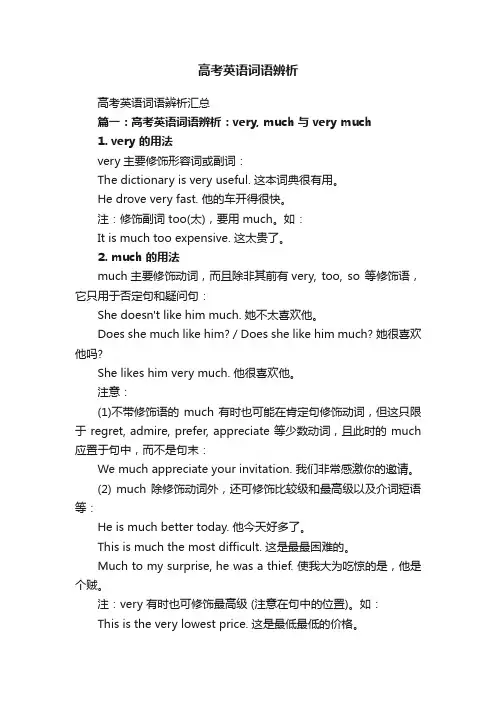
高考英语词语辨析高考英语词语辨析汇总篇一:高考英语词语辨析:very, much 与 very much1. very 的用法very主要修饰形容词或副词:The dictionary is very useful. 这本词典很有用。
He drove very fast. 他的车开得很快。
注:修饰副词 too(太),要用 much。
如:It is much too expensive. 这太贵了。
2. much 的用法much主要修饰动词,而且除非其前有very, too, so 等修饰语,它只用于否定句和疑问句:She doesn't like him much. 她不太喜欢他。
Does she much like him? / Does she like him much? 她很喜欢他吗?She likes him very much. 他很喜欢他。
注意:(1)不带修饰语的much有时也可能在肯定句修饰动词,但这只限于 regret, admire, prefer, appreciate 等少数动词,且此时的 much 应置于句中,而不是句末:We much appreciate your invitation. 我们非常感激你的邀请。
(2) much 除修饰动词外,还可修饰比较级和最高级以及介词短语等:He is much better today. 他今天好多了。
This is much the most difficult. 这是最最困难的。
Much to my surprise, he was a thief. 使我大为吃惊的是,他是个贼。
注:very 有时也可修饰最高级 (注意在句中的位置)。
如:This is the very lowest price. 这是最低最低的价格。
(3) 修饰过去分词,通常用 much,不用 very。
但修饰已经转化成形容词的过去分词,或形容词性质较强的过去分词(如过去分词作定语时),则可用 very。
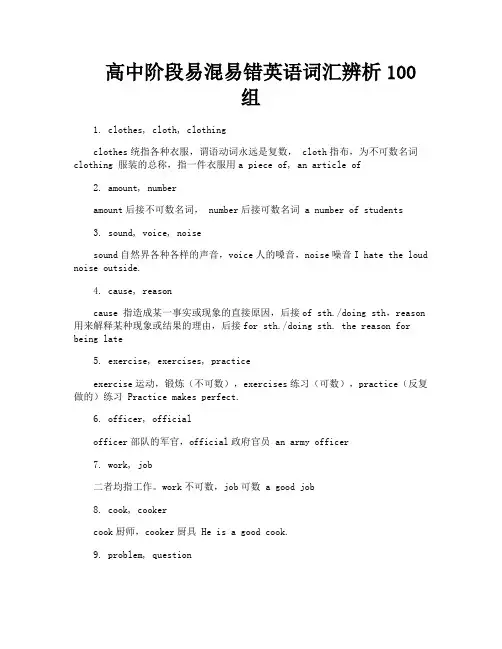
高中阶段易混易错英语词汇辨析100组1. clothes, cloth, clothingclothes统指各种衣服,谓语动词永远是复数, cloth指布,为不可数名词clothing 服装的总称,指一件衣服用a piece of, an article of2. amount, numberamount后接不可数名词, number后接可数名词 a number of students3. sound, voice, noisesound自然界各种各样的声音,voice人的嗓音,noise噪音I hate the loud noise outside.4. cause, reasoncause 指造成某一事实或现象的直接原因,后接of sth./doing sth,reason 用来解释某种现象或结果的理由,后接for sth./doing sth. the reason for being late5. exercise, exercises, practiceexercise运动,锻炼(不可数),exercises练习(可数),practice(反复做的)练习 Practice makes perfect.6. officer, officialofficer部队的军官,official政府官员 an army officer7. work, job二者均指工作。
work不可数,job可数 a good job8. cook, cookercook厨师,cooker厨具 He is a good cook.9. problem, questionproblem常和困难连系,前面的动词常为think about, solve, raise,question常和疑问连系,多和ask, answer连用10. a number of, the number ofa number of许多,谓语动词用复数。
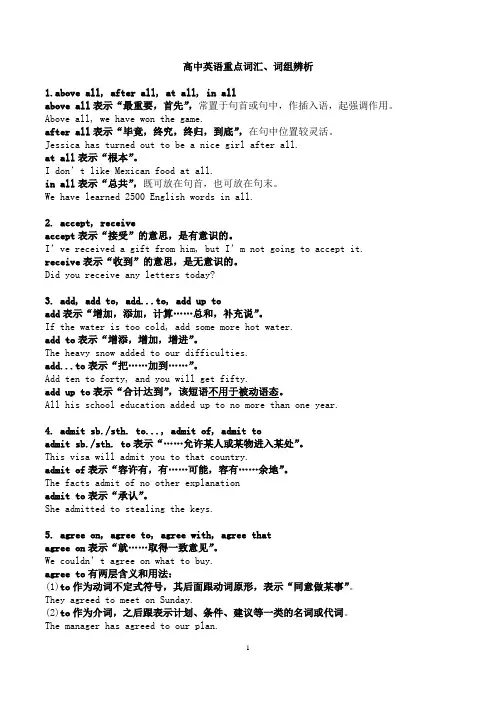
高中英语重点词汇、词组辨析1.above all, after all, at all, in allabove all表示“最重要,首先”,常置于句首或句中,作插入语,起强调作用。
Above all, we have won the game.after all表示“毕竟,终究,终归,到底”,在句中位置较灵活。
Jessica has turned out to be a nice girl after all.at all表示“根本”。
I don’t like Mexican food at all.in all表示“总共”,既可放在句首,也可放在句末。
We have learned 2500 English words in all.2. accept, receiveaccept表示“接受”的意思,是有意识的。
I’ve received a gift from him, but I’m not going to accept it. receive表示“收到”的意思,是无意识的。
Did you receive any letters today?3. add, add to, add...to, add up toadd表示“增加,添加,计算……总和,补充说”。
If the water is too cold, add some more hot water.add to表示“增添,增加,增进”。
The heavy snow added to our difficulties.add...to表示“把……加到……”。
Add ten to forty, and you will get fifty.add up to表示“合计达到”,该短语不用于被动语态。
All his school education added up to no more than one year.4. admit sb./sth. to..., admit of, admit toadmit sb./sth. to表示“……允许某人或某物进入某处”。
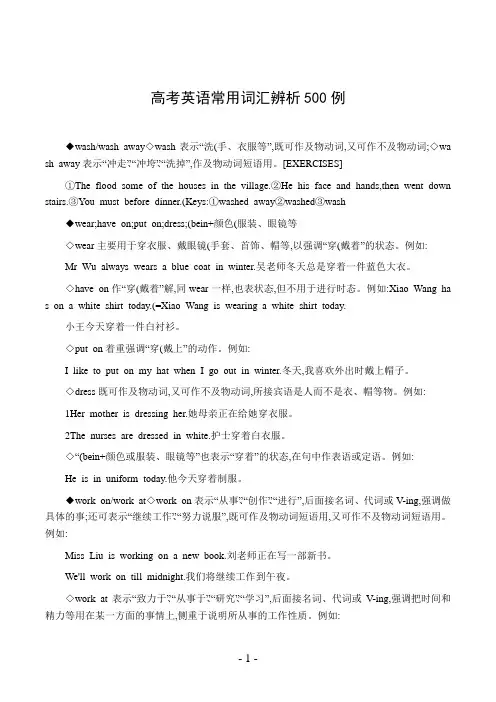
高考英语常用词汇辨析500例◆wash/wash away◇wash表示“洗(手、衣服等”,既可作及物动词,又可作不及物动词;◇wa sh away表示“冲走”、“冲垮”、“洗掉”,作及物动词短语用。
[EXERCISES]①The flood some of the houses in the village.②He his face and hands,then went down stairs.③You must before dinner.(Keys:①washed away②washed③wash◆wear;have on;put on;dress;(bein+颜色(服装、眼镜等◇wear主要用于穿衣服、戴眼镜(手套、首饰、帽等,以强调“穿(戴着”的状态。
例如:Mr Wu always wears a blue coat in winter.吴老师冬天总是穿着一件蓝色大衣。
◇have on作“穿(戴着”解,同wear一样,也表状态,但不用于进行时态。
例如:Xiao Wang ha s on a white shirt today.(=Xiao Wang is wearing a white shirt today.小王今天穿着一件白衬衫。
◇put on着重强调“穿(戴上”的动作。
例如:I like to put on my hat when I go out in winter.冬天,我喜欢外出时戴上帽子。
◇dress既可作及物动词,又可作不及物动词,所接宾语是人而不是衣、帽等物。
例如:1Her mother is dressing her.她母亲正在给她穿衣服。
2The nurses are dressed in white.护士穿着白衣服。
◇“(bein+颜色或服装、眼镜等”也表示“穿着”的状态,在句中作表语或定语。
例如:He is in uniform today.他今天穿着制服。
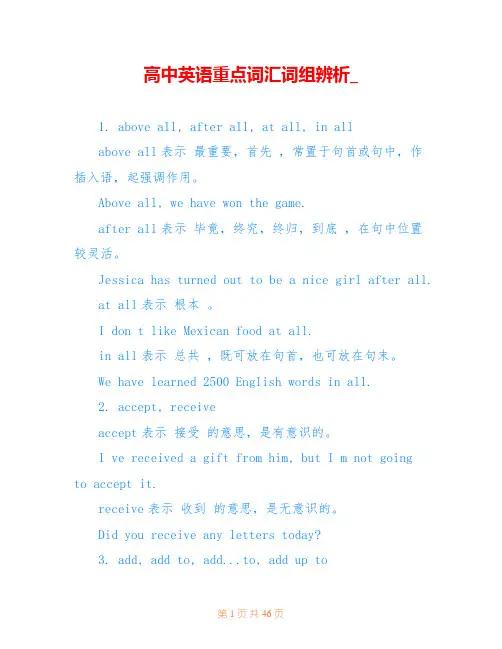
高中英语重点词汇词组辨析_1. above all, after all, at all, in allabove all表示最重要,首先,常置于句首或句中,作插入语,起强调作用。
Above all, we have won the game.after all表示毕竟,终究,终归,到底,在句中位置较灵活。
Jessica has turned out to be a nice girl after all.at all表示根本。
I don t like Mexican food at all.in all表示总共,既可放在句首,也可放在句末。
We have learned 2500 English words in all.2. accept, receiveaccept表示接受的意思,是有意识的。
I ve received a gift from him, but I m not goingto accept it.receive表示收到的意思,是无意识的。
Did you receive any letters today?3. add, add to, add...to, add up toadd表示增加,添加,计算总和,补充说。
If the water is too cold, add some more hot water.add to表示增添,增加,增进。
The heavy snow added to our difficulties.add...to表示把加到。
Add ten to forty, and you will get fifty.add up to表示合计达到,该短语不用于被动语态。
All his school education added up to no more than one year.4. admit sb./sth. to..., admit of, admit toadmit sb./sth. to表示允许某人或某物进入某处。

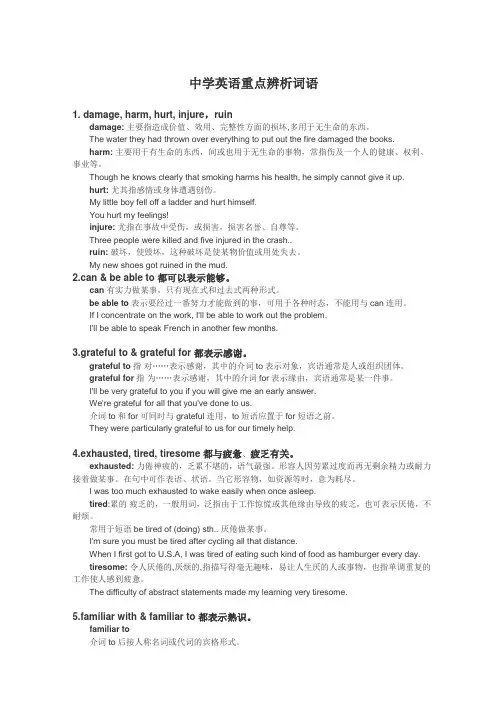
中学英语重点辨析词语1. damage, harm, hurt, injure,ruindamage:主要指造成价值、效用、完整性方面的损坏,多用于无生命的东西。
The water they had thrown over everything to put out the fire damaged the books.harm:主要用于有生命的东西,间或也用于无生命的事物,常指伤及一个人的健康、权利、事业等。
Though he knows clearly that smoking harms his health, he simply cannot give it up.hurt:尤其指感情或身体遭遇创伤。
My little boy fell off a ladder and hurt himself.You hurt my feelings!injure:尤指在事故中受伤,或损害,损害名誉、自尊等。
Three people were killed and five injured in the crash..ruin: 破坏,使毁坏,这种破坏是使某物价值或用处失去。
My new shoes got ruined in the mud.2.can & be able to 都可以表示能够。
can 有实力做某事,只有现在式和过去式两种形式。
be able to表示要经过一番努力才能做到的事,可用于各种时态,不能用与can连用。
If I concentrate on the work, I'll be able to work out the problem.I'll be able to speak French in another few months.3.grateful to & grateful for 都表示感谢。
grateful to指对……表示感谢,其中的介词to表示对象,宾语通常是人或组织团体。
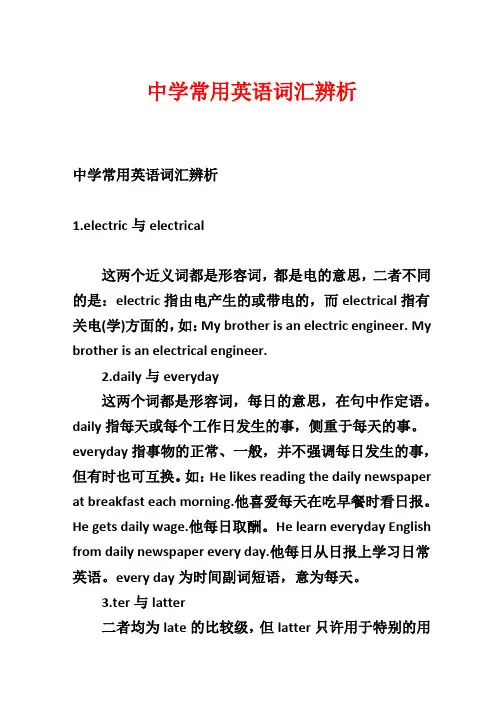
中学常用英语词汇辨析中学常用英语词汇辨析1.electric与electrical这两个近义词都是形容词,都是电的意思,二者不同的是:electric指由电产生的或带电的,而electrical指有关电(学)方面的,如:My brother is an electric engineer. My brother is an electrical engineer.2.daily与everyday这两个词都是形容词,每日的意思,在句中作定语。
daily指每天或每个工作日发生的事,侧重于每天的事。
everyday指事物的正常、一般,并不强调每日发生的事,但有时也可互换。
如:He likes reading the daily newspaper at breakfast each morning.他喜爱每天在吃早餐时看日报。
He gets daily wage.他每日取酬。
He learn everyday English from daily newspaper every day.他每日从日报上学习日常英语。
every day为时间副词短语,意为每天。
3.ter与latter二者均为late的比较级,但latter只许用于特别的用法,且不与than连用。
later作形容词或副词时,意为较迟的(地),较后的(地),如:in ones later life在晚年。
He came later than usual.他比平常晚来一点。
latter作形容词时,通常用于名词前,意为后者的,末尾的,如:in the latter part of a speech演说的后半段,the latter half of the year 下半年。
latter还可用作代词,the latter与the former是一组反义词组。
4.pick, pick out, select与choose这几个词都表示选择选择。
pick是口头用语,指无需细致考虑或鉴别就能作出的选择。
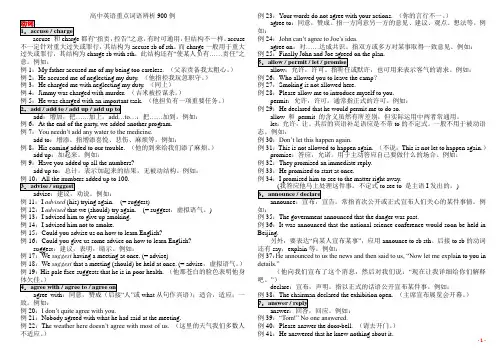
- 1 -高中英语重点词语辨析900例都有“指责,控告”之意,有时可通用,但结构不一样。
accuse 不一定针对重大过失或罪行,其结构为accuse sb of sth 。
而charge 一般用于重大过失或罪行,其结构为charge sb with sth ,此结构还有“使某人负有……责任”之意。
例如:例1:My father accused me of my being too careless. (父亲责备我太粗心。
) 例2:He accused me of neglecting my duty. (他指控我玩忽职守。
) 例3:He charged me with neglecting my duty. (同上)例4:Jimmy was charged with murder. (吉米被控谋杀。
)(他担负有一项重要任务。
) :把……加到。
例如: 例6:At the end of the party, we added another program. 例7:You needn’t add any water to the medicine.add to :增添。
指增添喜悦、悲伤、麻烦等。
例如:例8:His coming added to our trouble. (他的到来给我们添了麻烦。
)add up :加起来。
例如:例9:Have you added up all the numbers?add up to :总计。
表示加起来的结果,无被动结构。
例如:例11:I advised (his) trying again. (= suggest)例12:I advised that we (should) try again. (= suggest ,虚拟语气。
) 例13:I advised him to give up smoking. 例14:I advised him not to smoke.例15:Could you advise us on how to learn English?例16:Could you give us some advice on how to learn English?suggest :建议,表明,暗示。
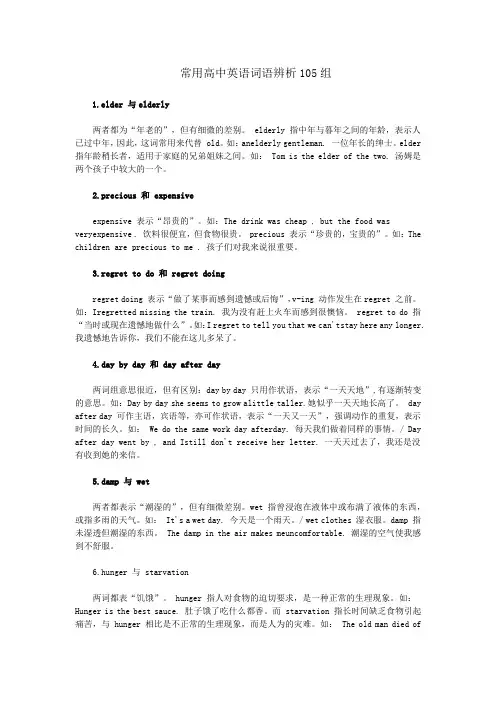
常用高中英语词语辨析105组1.elder 与elderly两者都为“年老的”,但有细微的差别。
elderly 指中年与暮年之间的年龄,表示人已过中年,因此,这词常用来代替 old。
如:anelderly gentleman. 一位年长的绅士。
elder 指年龄稍长者,适用于家庭的兄弟姐妹之间。
如: Tom is the elder of the two. 汤姆是两个孩子中较大的一个。
2.precious 和 expensiveexpensive 表示“昂贵的”。
如:The drink was cheap , but the food was veryexpensive . 饮料很便宜,但食物很贵。
precious 表示“珍贵的,宝贵的”。
如:The children are precious to me . 孩子们对我来说很重要。
3.regret to do 和 regret doingregret doing 表示“做了某事而感到遗憾或后悔”,v-ing 动作发生在regret 之前。
如:Iregretted missing the train. 我为没有赶上火车而感到很懊恼。
regret to do 指“当时或现在遗憾地做什么”。
如:I regret to tell you that we can'tstay here any longer. 我遗憾地告诉你,我们不能在这儿多呆了。
4.day by day 和 day after day两词组意思很近,但有区别:day by day 只用作状语,表示“一天天地”,有逐渐转变的意思。
如:Day by day she seems to grow alittle taller.她似乎一天天地长高了。
day after day 可作主语,宾语等,亦可作状语,表示“一天又一天”,强调动作的重复,表示时间的长久。
如: We do the same work day afterday. 每天我们做着同样的事情。
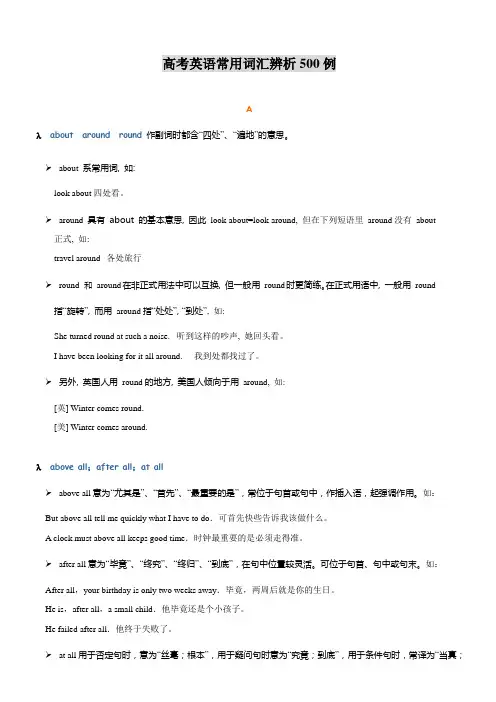
高考英语常用词汇辨析500例Aλabout around round作副词时都含“四处”、“遍地”的意思。
about 系常用词, 如:look about四处看。
around 具有 about 的基本意思, 因此look about=look around, 但在下列短语里around没有about正式, 如:travel around 各处旅行round 和around在非正式用法中可以互换, 但一般用round时更简练。
在正式用语中, 一般用round指“旋转”, 而用around指“处处”, “到处”, 如:She turned round at such a noise. 听到这样的吵声, 她回头看。
I have been looking for it all around. 我到处都找过了。
另外, 英国人用round的地方, 美国人倾向于用around, 如:[英] Winter comes round.[美] Winter comes around.λabove all;after all;at allabove all意为“尤其是”、“首先”、“最重要的是”,常位于句首或句中,作插入语,起强调作用。
如:But above all tell me quickly what I have to do.可首先快些告诉我该做什么。
A clock must above all keeps good time.时钟最重要的是必须走得准。
after all意为“毕竟”、“终究”、“终归”、“到底”,在句中位臵较灵活。
可位于句首、句中或句末。
如:After all,your birthday is only two weeks away.毕竟,两周后就是你的生日。
He is,after all,a small child.他毕竟还是个小孩子。
He failed after all.他终于失败了。
at all用于否定句时,意为“丝毫;根本”,用于疑问句时意为“究竟;到底”,用于条件句时,常译为“当真;实在”。
专题内容:词语辨析专讲(一)词语辨析1. believe 与believe ineg. You shouldn’t believe everything you read .你不应当相信你阅读到的所有东西都是真的。
I can ’t believe in such silly ideas . 我才不相信这些可笑的想法呢。
2. fight against , fight for , fight witheg. We must fight for peace and development .They fought against / with the enemy firercely .They were fighting with the Red Army men .We fight against all forms of hunting .3. supply vt. ⎩⎨⎧sth.with sb.sb.to sth. eg. The shop supplies milk to each house in bottles .The school supplied the children with books .supply n.The water supply here is good .4. away , far away , farawayeg. The sea is 2 miles away from the hotel .My home is far away from the school .This is a faraway city .5. nothing but / excepteg. We go to bed before 10 , except in the summer .Everyone but / except you has seen the film .She did nothing but / except cry .He has no choice but to obey .6. as a result , as a result of …eg. He worked very hard , As a result , he succeed .He was late as a result of the snow .7. just now , at onceeg. He was here just now . We should start right now .8. a variety of ⎩⎨⎧++v(sl)c.n(pl)v(pl)c.n(pl) eg. A variety of toys are on show in the shop .A variety of books he has is astonishing .9. by oneself , for oneself , of oneselfeg. He went for a holiday by himself .Do you have anything to say for yourself ?The door closed of itself .10. certain , someeg. A certain Wang asked to see you .He went to some place in HongKong .11. information , news , messageinformation :专指人们特别关心的消息、情报、资料等,侧重内容。
conventional墨守成规的conservative保守的controversial有争议的contradictory互相矛盾的conservation (n.保护节约property财产所有物properly正确地恰当地bound有义务的必然的bond纽带束缚物fond喜爱…的casual随便的cautious小心的account账户amount数量counter柜台section部分selection选择minister部长大臣military军队军事的scene景象sense感觉claim认领声称calm冷静的commission委员会committee委员会attract(v.吸引attack(v.袭击attach贴上使依附latter后者后面的later(adv,后来letter信Christian基督教徒(的)Christmas圣诞节grind研磨苦差事blind瞎的severe极为恶劣的严肃的serve提供服务v.accept接受aspect方面broad宽阔的宽阔部分border边界aboard在船上adv./prep.abroad在国外adv.principal校长主/首要的principle原则原理contract合同conduct行为举止实施(v.contact联系precious珍贵的强调极少precise精确的恰好的trick玩笑treat照顾involve涉及需要include包括conscience良心conscious有意识的sacred神圣不可侵犯的scared害怕的definitely毫无疑问地definition定义cabin小屋船舱carbon碳costume服装customer顾客customs海关wrist手腕waist腰twist使弯曲变形bench长凳beach海滩infection传染病effect影响(n.distinguish区别(v.extinguish扑灭熄灭astonish使吃惊journey旅行journal日志afford承担得起(v.affect影响(v.effect影响(n.constitution宪法组成consistent始终如一的compass指南针campus校园obvious明显的observe观察regular有规律的regulate管理控制virtue美德virtual虚拟的事实上的mature成熟的成熟(v.explosion爆炸(n.exploration探索(n.radio无线电广播radiation辐射放射物radioactive辐射的flavor风味调味flour面粉fragment碎片fragrant芬芳的香的frequent频繁的fluent流畅的prisoner囚犯pioneer先驱rescue救援(v. sauce酱料glue胶水黏合clue线索accept接受aspect方面leather皮革feather羽毛glitter闪亮(v.clump丛簇slump暴跌possess拥有access进入assess评估pale苍白的pole杆子地级envision设想(v.evidence证据证明batter殴打better更好的flatter奉承讨好amount数量account账户chant反复呼喊chain链条trick诡计欺骗thick厚的situate使坐落于situation情况modem调制解调器modern现代的insist坚持坚称persist顽强坚持执着(v.praise 称赞赞美price价格mild温和的wild野生的valid有效的正当合理的vivid生动的disease疾病diverse不同的compliment称赞(n. compliant顺从的符合的complain抱怨complicity共犯同谋(n. complimentary免费的complacency自满(n. confluence汇合点stimulate刺激激发simulate假装模拟glory荣誉gallery走廊画廊展览馆speculate推测猜想suspension暂时停职暂停lunatic疯子极其愚蠢的inmate精神病院病人囚犯imitate模仿效仿insane精神病人(n. adj.innate天生的inflate充气夸大inundate使…应接不暇explicit清楚的明确的enlist赢得获得expire到期失效死亡equine似马的enquire询问,打听inquire询问,打听quince温柏requite回报(v.pit深坑果核wit头脑明智akin类似的近似的rank地位级别rod杆竿rob抢劫rib肋骨rid摆脱了的bid喊价robe长袍浴袍legislation 法律法规regulation规章制度propose提议建议promise承诺premise前提经营场所precise精确的contain容纳maintain维持维修lighting灯光lightning闪电gist要点主旨disk磁盘光盘snack小吃点心snake蛇sneaker运动鞋fair公平的fire火灾火wad一沓sag下垂减少(vi. wag摆动(尾巴)swell增加肿胀spill溢出spell拼写channel频道输送canal运河dumb傻的哑口无言的哑的comb梳子numb麻木的失去知觉的classify将…分类clarify阐明阐释stain弄脏strain压力劳损strait海峡strand股缕sustain保持vague含糊的笼统的cursory粗略的仓促的compulsory义务的deliberately故意地慎重地desperately绝望地拼命地mat小地毯团簇mass团群众大批的mess杂乱(n. 弄乱rent租rate率比率breast乳房胸部beast野兽nearly几乎差不多newly最近刚刚numb麻木的thumb拇指lump块方糖delicate易受损的精美的indicate表明指向dedicated献身的专用的delineate描述解释deliberate故意的steak牛排肉排stick粘住将…刺入foreigner外国人frontier国界前沿distinct截然不同的清晰的destination目的地distant遥远的divorce离婚diverse不同的jar玻璃罐jam果酱卡住gum口香糖牙床sum金额总和hub(活动)中心轮毂model模特medal奖牌勋章remand将嫌疑人还押候审demand要求需求content内容目录contend声张主张convent女修道院convert转变改变stout肥壮的黑啤酒spout(容器的)嘴喷水accelerate加快加速accumulate积累container容器continent大洲大陆boast自夸自吹自擂boost使增长推动zeal热情veal小牛肉牛犊肉oval椭圆形的oral口头的pension养老金passion热情激情antidote解药矫正方法anecdote轶事趣闻date日期data资料数据extract摘录exact精确的extra额外的lorry卡车lobby门廊大厅游说withhold扣留隐瞒withdraw使撤回使退出withstand经受住承受raze 使夷为平地彻底摧毁rapt专心致志的极高兴的equality均等平等equity公平股票garbage垃圾箱garage车库汽车修理厂offshore海上的近海的offence违法行为obscure无名的费解的obstacle阻碍障碍物boom繁荣bomb炸弹轰炸director经理导演detector探测器dictator独裁者专横的人disability残疾inability无能无力capability能力才能visibility能见度引人注目性balcony 阳台bungalow平房acre英亩arch拱起拱门tic面部肌肉抽搐arc弧电弧loyal忠诚的royal王室的皇族evolution进化revolution革命变革旋转millennium一千年millionaire百万富翁wing翅膀swing使摆动使转弯somehow以某种方式不知为什么somewhat有点religious宗教的虔诚的ridiculous荒谬的可笑的saucer茶碟茶托saunter漫步闲逛stove炉子stoke给…添加燃料煽动pile堆摞file文件dismiss不予考虑开除missile导弹 (武器)投掷物resume简历assume假设承担presume推测compromise妥协危及comprise包括构成statue雕像status地位状态carriage马车火车车厢cottage乡间草屋村舍liter升liner邮轮内衬interpret解释把…理解为interfere干涉妨碍swear发誓要咒骂spear标枪矛murder谋杀讨厌的事mourn哀悼对…感到遗憾illusion错觉幻想collision碰撞相撞density密度稠密destiny命运dignity庄重尊严demise终止消亡root根rot使腐烂rote死记硬背bucket桶racket喧哗声rocket火箭dictation口述听写diction吐字发音方式savor品味风味savour品味体验saucer茶碟茶托saunter悠闲地走漫步spray喷喷洒喷雾stray走失走失的离群的人capsule胶囊航天舱容器castle城堡 (国际象棋中)车throughout遍及自始至终thorough全面的彻底的rile使恼火激怒rail铁路铁轨栏杆drag拖拉drug毒品药物planet行星地球plate盘一盘电镀symphony交响乐sympathy同情支持symptom症状征兆acquaintance认识的人认识了解acquirement获得学的东西acute严重的剧烈的accuse指责指控grasp抓紧理解grape葡萄tick发出滴答声click点击使咔哒响bargain便宜货讨价还价margin页边空白处利润concentrate全神贯注集中compensate弥补补偿spill使溢出洒出swell肿胀充满激情spell拼写generate产生引起general普遍的总的wrestle摔跤扭打whistle口哨吹口哨trestle(放桌面上的)支架astronaut宇航员astronomer天文学家anyhow反正尽管如此anchor锚主持人analog模拟的指针式的constraint限制束缚contradict反驳否认pub酒馆酒吧inn小旅馆小酒馆cab出租车驾驶室nest鸟巢neck颈脖子mental精神上的智力的normal正常的平常的moral道德的有道德的morale士气精神面貌dilemma进退两难的境地diploma毕业文凭结业证prejudice偏见成见prejudge预先or过早判断envy羡慕忌妒navy海军藏青色federal联邦制的funeral葬礼丧礼Atlantic大西洋大西洋的Antarctic南极地区南极的Arctic北极地区北极的Pacific太平洋太平洋的European欧洲人欧洲的Asian亚洲人亚洲的Asia亚洲African非洲人非洲的Oceania大洋洲Europe欧洲欧盟Buddhism佛教Christian基督徒基督教的。
高中英语词汇一句之中巧辨析1. Hunting is allowed in this area, though not officially permitted.2. I received his gift from him, but I didn’t accept it。
3. You should be ashamed of your shameful behaviors.4. The boss insisted that the man had stolen the money and insisted that he (should) leave the company atonce.。
5. There are so many cakes for me to choose from that I can’t make up my mind which to choose.6. Be sure to get to the airport on time, and make sure everything is ready before you start.7. It seemed that she was not a bit worried, but in fact, she was not a little worried about it.8. He felt so sleepy that he soon fell asleep.9. I called at his house, but he wasn’t in. So I left a message telling him that I would call on him the nextday.10. I know him, but when I saw him last night, I could hardly recognize him.11. The motor cost me 4300 Yuan. But I don’t think it’s worth that much.12. They got married in 1995. So far they have been married for 10 years.13. when she found her necklace missing, she knew that the necklace was lost forever.。
中学英语常用词汇辨析中学英语常用词汇辨析1. clothes, cloth, clothingClothes统指各种衣服,谓语动词恒久是复数:cloth指布,为不行数动词:clothing为服装的总称,指一件衣服用a piece of clothing, an article of clothing2. incident, accidentIncident指小事务:accident指不幸的事故3. amount, numberAmount后接不行数名词:number后接可数名次:如:a number of students 4. family, house, homeHone家,包括住处和家人:house房子,住宅:family家庭成员,如:My family is a happy one.5. sound, voice, noisesound自然界各种各样的声音:voice人的嗓音:noise噪音,如:I hate the loud noise outside.6. photo, picture, drawingPhoto用照相机拍摄的照片:picture可指相片,图片,电影片:drawing指画的画7. vocabulary, wordVocabulary词汇,一个人拥有的单词量:word详细的单词8. population, peoplePopulation人口,人数:people详细的人9. weather, climateWeather一天内详细的天气状况:climate长期的气候状况10. road, street, path, wayroad详细的马路,马路:street街道:path小路,小径:way道路,途径11. course, subjectCourse课程(可包括多门科目):subject科目(详细的学科),如: a summer course12. course, habitcustom传统风俗,习俗,也可指生活习惯,后接to do: habit生活习惯,习惯成自然,后接of doing13. cause, reasoncause制造成某一事实或现象的干脆缘由,后接of sth./doing sth.: reason 用来说明某种现象或结果的理由,后接for sth./doing sth. 如:the reason for being late14. exercise, exercises, practiceExercise运动,熬炼(不行数):exercises练习(可数):practice(反复做的)练习,如:Practice makes perfect.15. class, lesson作“课”解时,两者可以替换。
高考中常考的词义辨析1.以构成形式为突破口进行辨析:1).差一冠词,意义不同:in charge of 负责in the charge of 由。
负责in possession of 占有in the possession of 由。
所占有by sea 乘船by the sea 在海边out of question 没问题out of the question 不可能at table 在吃饭at the table 在桌边2).有无介词,意义不同:answer answer for对。
负责,偿还search search for leave leave for 离开去某地reach reach for 伸手去拿enter enter for 报名参加run run forstand stand for pay pay for 付钱买某物prepare prepare fpr 3).词序颠倒,意义不同:before long long before much too too muchturn in in turn hand in in hand 在手边work hard hard work from far 来自远方far from 离得远,远非if only only if4).是分是和,意义不同:so as to so…as to sometimes some timessometime some time everyday every dayaltogether all together everyone every onenone no one5).差一字母,用法不同:alone lonely asleep sleep alike like arise产生,发生,出现rise await vt. 等候wait across prep. cross v. 横越adj. 交叉的,易怒的aloud loud2.以词汇意义为突破口进行辨析:1).意义内涵不同:【destroy , damage , ruin】The boy ruined the beautiful picture with ink on purpose. (不可修复)His hope of being a singer was destroyed. (不可修复)The heavy rain damaged a lot of houses. (可修复)【quiet , silent , still】Be quiet and get on with your work.. 安静的,寂静的。
高中英语词汇辨析100句单词的意义、搭配及其运用是高中英语词汇教学的主要内容,其中一些词义的辨析是很令人头疼的,而且也很难记得明白。
但如果能在一个句子中将几个词的词义差异部分同时展示出来,这样的例句在英语的教学中起着事半功倍的作用。
如:1、Hunting is allowed in this area, though not officially permitted.这个地区是可以狩猎的,尽管法律上不允许。
allow指“听凭”,“不禁止”,含有消极的意味。
permit指正式地“允许”或根据法律规定“许可”, 比allow来得积极。
2、I received his gift from him, but I didn’t accept it .我收到他的礼物,但我没有接受。
3、You should be ashamed of your shameful behaviors.你应该为你的可耻的行为感到羞愧。
4、The boss insisted that the man had stolen the money and insisted that he (should) leave the company at once.老板坚持说那个人偷了钱并坚持要求他立刻离开公司。
5、There are so many cakes for me to choose from that I can’t make up my mind which to choose.有那么多的蛋糕可供从中选择,我无法决定选择哪一个。
6、Be sure to get to the airport on time, and make sure everything is ready before you start.务必要准时到机场并且确保在出发前一切都准备好了。
7、It seemed that she was not a bit worried, but in fact, she was not a little worried about it.表面看来她似乎一点也不担心,事实上她非常担心。
8、He felt so sleepy that he soon fell asleep.他觉得很瞌睡很快就睡着了。
9、I called at his house, but he wasn’t in. So I left a message telling him that I would call on him the next day.我到他家拜访,可他不在家。
所以我留下口信告诉他第二天再去拜访他。
10、I know him, but when I saw him last night, I could hardly recognize him.我知道他,但当我昨天见到他的时候几乎没认出他来。
11、The motor cost me 4300 Yuan. But I don’t think it’s worth that much.这辆摩托花了我4300元,但认为它不值这个钱。
12、They got married in 1995. So far they have been married for 10 years.他们是1995年结的婚(瞬间动作),到现在已经结婚(延续动作)十年了。
13、when she found her necklace missing, she knew that the necklace was lost forever.当她发现项链不见了便知道它再也找不着了。
14、Don’t believe what he says. Work hard and believe in yourself, and you’ll succeed one day.不要相信他说的话,努力学习,相信你自己,你会成功的。
15、He cut down the tree and cut it up for winter use.他把树砍倒并砍碎准备过冬用。
16、The sailor has rich experience and he often tells us his interesting experiences.这水手有丰富的经验,他经常给我们讲他有趣的经历。
17. I was greatly moved by this moving story. 我被这个感人的故事深深感动了。
18、I’m very pleased with my own cooking .It has a pleasant smell and I’m sure it will please my husband.我对自己做的菜感到满意,菜闻起来不错,肯定能令丈夫高兴的。
19、The boy lied that a hen was lying under the tree laying eggs.那男孩撒谎说有只母鸡(躺)在树下生蛋。
20、My suitcase contains some clothes, including a few sweaters and trousers.我箱子里面有些衣服,包括几件毛衣和几条裤子。
附:The whole book contains 12units, including two mainly revisions.整个这本书有十二个单元,包括两个单元的总复习。
21、These shoes cost too much. What’s more, they are much too small for me.这鞋花费太多,而且我穿着太小。
附:I’ve got too much work to do on a much too cold winter night.在一个非常寒冷的冬夜,我有太多的工作要做。
22、I can’t think of his name, but I’ll think about what he has said to me.我想不起他的名字,但我会考虑他跟我说过的话。
23、I used to rise very late during the summer vacation, but I’ve got used to getting up very early .我(过去)在暑假期间常常起得很晚,但现在习惯了起得很早。
24、He is sitting in the front of the car and can see a pond clearly in front of the car.他坐在轿车前部可以清楚地看见有一个池塘在前面。
25、Last year, my total income, with my reward added to, added up to 15000yuan.去年我的总收入,加上奖金,总计为一万五千元。
26、The bed made of wood is mad up of three separate parts.这张(由)木制的床由三部分组成。
27、Japan lies to the east of China in the east of Asia. It faces the Pacific on the east.日本在亚洲东部(范围内),中国东面(不接壤),东临太平洋(接壤)。
28、We were all deeply shocked when we heard that some workers were deep in the well.当我们得知一些工人被深埋井下时都深感震惊。
29、His life was in danger when facing the dangerous tiger.面对危险的老虎,他的生命处于危险之中。
30、He lives alone in a lonely mountain village, but he doesn’t feel lonely.他独自一人住在一个偏僻的山村里,但并不觉得孤独。
31、——David has made great progress recently.最近戴维进步很大。
——So he has, and so have you.他确实进步很大,你也是。
32、Gibert discovered electricity, but Edison invented the light bulb.吉波特发现了电,然而是爱迪生发明了电灯。
33、For once we heard a loud noise so we stood at once.有一次我们听到一声巨响,都立刻站了起来。
34、I read the newspaper and read of his death.我读了报纸,得知他死去的消息。
35、She looked for her cellphone everywhere and found it at last.她到处找她的手机,最后找着了。
36、Whatever David says sounds right to Helen. That’s why she has made up her mind to live with him whatever (no matter what) happens.对海伦来说,无论戴维说什么(名词性从句)都是对的。
这就是为什么她决心无论发生什么事(状语从句)都要和他在一起。
37、An ordinary worker in Beijing earns 1800 yuan a month, which is common nowadays.北京一个普通工人一个月能赚一千八百元,如今也很常见了。
38、He went specially to see her in such an especially hot summer.在这样一个特别炎热的夏天,他特意地去看她。
39、A respectable man is one who is worthy of being respected.一个令人尊敬的人是值得受人尊敬的。
40、Though he is not young any longer, he has a youthful attitude towards life.尽管他已不再年轻,他对人生仍有年轻人般的态度。
41、One may have a character, but may have many characteristics, all of which constitute one’s character.一个人可能只有一种“性格”,但可能有多种“特征,特点”,所有这些“特征特点”便构成了一个人“总的特征,品质”。